PARIS: Including peanuts in children’s diets early in life could help stave off allergies against the legume, which can be fatal and affect swathes of youngsters globally, according to a new study Friday.
Researchers found that introducing peanut products to babies and infants, and gradually increasing exposure, led to greater tolerance for the common allergen.
The peer-reviewed study, published in The Lancet, involved 146 peanut-allergic children aged between zero and three over two-and-a-half years.
Of the group, 96 were given peanut protein powder every day, with the dose increasing progressively to the equivalent of six peanuts. The other children received a placebo of oat flour.
Twenty of the children who received peanut powder showed allergy remission, meaning no allergic reaction occurred six months after the therapy ended.
One child in the placebo group showed remission.
Six months after the treatment, the children in remission could tolerate a dose equivalent to 16 peanuts.
An additional 20 children who received peanut powder were considered ‘desensitised’, meaning they had a higher allergic threshold but were not considered in remission.
These children could tolerate a dose equivalent to between six and 12 peanuts six months after the treatment ended.
The youngest children in the study experienced remission the most often, and the best results were in those under 12 months.
“Very early interventions may provide the best opportunity to achieve remission,” said co-author Stacie Jones.
Peanut allergies affect two percent of children in Western countries, according to the study, and can last a lifetime.
Affected children must avoid eating peanuts and have self-injectable adrenaline available to fight allergic shocks, which can be fatal if they are accidentally exposed.
Exposure can even occur when a child hugs someone who has just consumed peanuts.
“There are no treatment options, resulting in a considerable burden on allergic children and their caregivers to avoid accidental exposure,” said co-author Wesley Burks.
“In severe cases, this can restrict peanut-allergic children’s freedoms, particularly when it comes to navigating daycare or schools and public spaces where access to a safe diet is in jeopardy,” he added.
Previous studies have produced similar results but the length of the latest studies makes it unique.
Although it provided important results, it may not reflect the behavior of the children’s bodies in real-world conditions.
The study was conducted under close medical supervision, and adrenaline injections were administered on 21 children during the trial.
Adding peanuts to young children’s diet can help avoid allergy: study
https://arab.news/m9fkg
Adding peanuts to young children’s diet can help avoid allergy: study

- Six months after the treatment, the children in remission could tolerate a dose equivalent to 16 peanuts
Where We Are Going Today: Ext. Seventeen Restaurant in Jeddah

- The menu offers a mix of Saudi flavors with a contemporary twist
Ext. Seventeen, a home-grown eatery by chef Amal Fakeih in Al-Yamamah district is a great spot for breakfast in Jeddah.
If you are looking for a place where you can enjoy a hearty breakfast and let time slip into lunch, this is it. The space is intimate, casual, and feels like a second home. The bistro-inspired environment, complemented by serene music, makes for a peaceful dining experience.
The menu offers a mix of Saudi flavors with a contemporary twist. During my visit, I decided to try their signature dishes, including the shakshuka with cherry tomatoes and thyme, and the labneh toast topped with sun-dried tomatoes, and it did not disappoint.
The fusion of Middle Eastern ingredients and Western techniques is evident in dishes like the popular apple pancakes and fondue, which are worth indulging in. For something lighter, I recommend the sweet salad with roasted beetroot and kale.
If you are dining with others, the “To Share” section of the menu is a great option, with offerings like a cheese platter and spicy dip served with pita chips.
The menu may not appear extravagant at first glance, but instead it leans towards familiar, home-style dishes.
Chef Amal takes the comfort of traditional home-cooked meals and gives each dish a thoughtful twist.
That being said, while the food is generally delicious, the space, though cozy, can feel a bit cramped, especially during peak hours. Additionally, I feel that the portion sizes could be slightly larger.
You can enjoy a hearty plate for around SR60 ($16), while more premium choices like the steak and eggs come in closer to SR100. If you are dining with friends or family, the sharing boxes and platters, priced around SR150.
When it comes to sweets, the lineup is both comforting and creative. There is cardamom French toast, cinnamon banana pancakes, and the standout fluffy coffee pancakes layered with coffee custard, maple syrup, toasted walnuts, and their signature cream is heavenly.
Check @extseventeen on Instagram for more details.
Where We Are Going Today: Yasumi Ramen

Yasumi Ramen has established itself as a go-to spot for a Japanese ramen experience in the Eastern Province.
It has just two branches in the Kingdom — one in Dhahran, which opened in 2022, and a newer location which opened in Alkhobar in late 2024 — and both spots share minimalist interiors and a near-identical menu.
The ramen here is thoughtfully prepared: we tried the ichiraku ramen, the most popular, according to the hostess. It contained large flat strips of chicken with a miso base. The crunchy bean sprouts and scallions alongside the Naruto fishcake offered different textures in each mouthful.
The ajitama — seasoned soy egg — served with thin noodles was cooked to perfection and the sheet of nori added bite.
The homemade iced tea, served with fresh lemon, was tangy without being overpowering, providing a refreshing counterpoint to the richness of the food.
Unfortunately, we were informed that the bestselling mango mochi was sold out.
There were no other customers present, turning the dining experience into a peaceful retreat in this otherwise bustling part of town.
If you’re intending to visit, do be mindful that parking spots are limited.
For more details check @yasumiramen on Instagram.
Where We Are Going Today: ‘Century Burger’ restaurant in Jeddah

- The original CB, my repeat order, is a simple burger packed with flavor, served with pillow-soft buns, a thick beef patty, Swiss cheese, lettuce, tomato and the signature CB sauce
Saudi burger joint Century Burger offers an extensive menu of mouthwatering dishes.
Known for its hearty meals and fresh ingredients, Century Burger began in Jeddah, where it established its first restaurant on Prince Sultan Road.
Today, the chain has 13 stores across the Kingdom and is among the largest Saudi casual dining brands.
I usually like to start with the black beetroot salad, a refreshing mix of arugula, beetroot, red onion, cooked sweet potatoes, feta cheese and a tangy dressing.
The original CB, my repeat order, is a simple burger packed with flavor, served with pillow-soft buns, a thick beef patty, Swiss cheese, lettuce, tomato and the signature CB sauce.
When I crave something savory and spicy, I opt for the fajita burger: A succulent beef patty topped with fresh grilled vegetables, fajita seasoning and melted cheese.
For anyone looking to reduce their carb intake, the keto burger is savory, delicious and very filling.
One of Century Burger’s many creative takes on burgers is black umami, served with black squid ink buns, grilled chicken breast, Swiss cheese, arugula, crispy onion, a house-made umami sauce and pickles.
The restaurant also offers variety of starters and side orders, from flavored chicken wings and chicken strips to various shrimp options.
Where We Are Going Today: Bab Sharqi – Saudi brand sweets

- This artistic touch makes their packaging both elegant and culturally meaningful
Eid is here, bringing joy, gatherings, and the tradition of sharing sweets. Bab Sharqi, a renowned Saudi brand, blends authenticity and luxury to enhance your celebrations.
Specializing in Middle Eastern confections and petit four, Bab Sharqi distributes its creations across the Kingdom.
The name Bab Sharqi, meaning “Eastern Gate,” reflects the rich heritage of the Arab world. Each box showcases stunning illustrations of historical landmarks from Riyadh, Jazan, AlUla, and Diriyah to Petra and Jerash in Jordan and beyond.
This artistic touch makes their packaging both elegant and culturally meaningful.
I tried their chocolate petit four, and it instantly became my favorite with Saudi coffee. Its buttery, melt-in-your-mouth texture and rich chocolate coating make it perfect for guests or personal indulgence.
They also offer milk petit four, assorted options in various sizes, and beautifully packaged baklava trays with cashew, pistachio, pecan, and even chocolate baklava.
For an extra special treat, the Orientals box is perfect for Eid gatherings. It features baklava filled with pecans and salted caramel, almonds, pistachios, and coconut, all coated in fine Belgian chocolate.
Bab Sharqi’s sweets are available for delivery via HungerStation, ToYou, and Keeta or in-store at Kottouf Wa Hala, a boutique for local and regional sweets.
For more details, visit @babsharqisweets on Instagram.
Fitness enthusiasts challenge themselves with pre-iftar hikes in Pakistani capital

- Hikers set out hour before sunset, break fast on trails on Margalla Hills National Park
- Participants say pre-iftar hikes help boost fat burning, maintain weight in Ramadan
ISLAMABAD: Zarnab Tahir struggled to catch her breath as the steep incline of the hiking trail at Islamabad’s picturesque Margalla Hills tested her endurance. Hiking can put people through physical exertion, especially when they do it on an empty stomach.
An hour before the sun sets and the call to prayer blares out from various mosques located in Pakistan’s capital city, a group of fitness enthusiasts take to the hiking trails in Margalla Hills National Park.
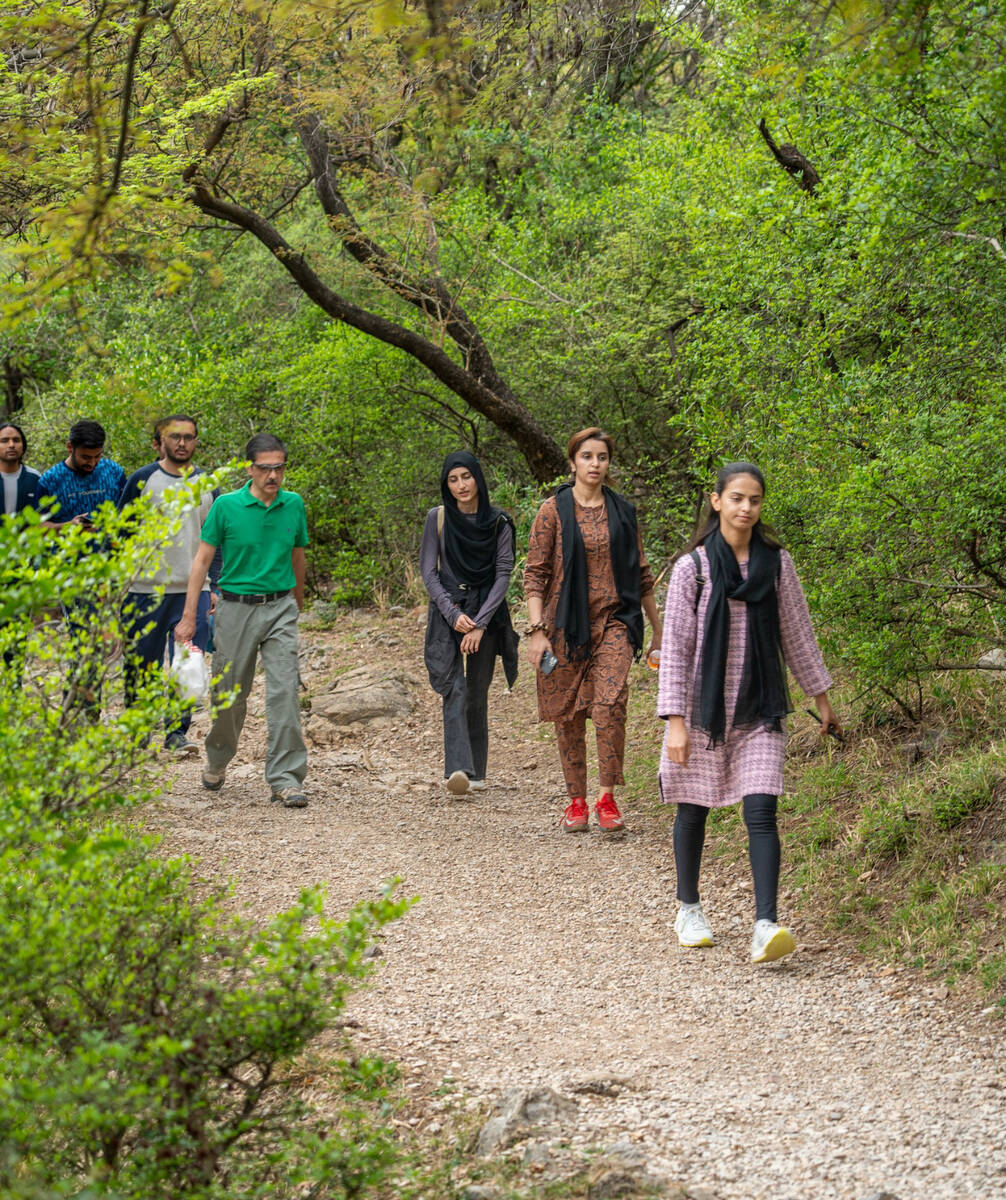
Islamabad Run With Us — IRU — which describes itself as Pakistan’s “pioneering running community,” is behind the pre-iftar hiking initiative.
“When you engage in pre-iftar (physical) activities during Ramadan, it gives you extra energy, an extra boost,” Qasim Naz, who founded IRU in 2016, told Arab News on hiking trail number three.
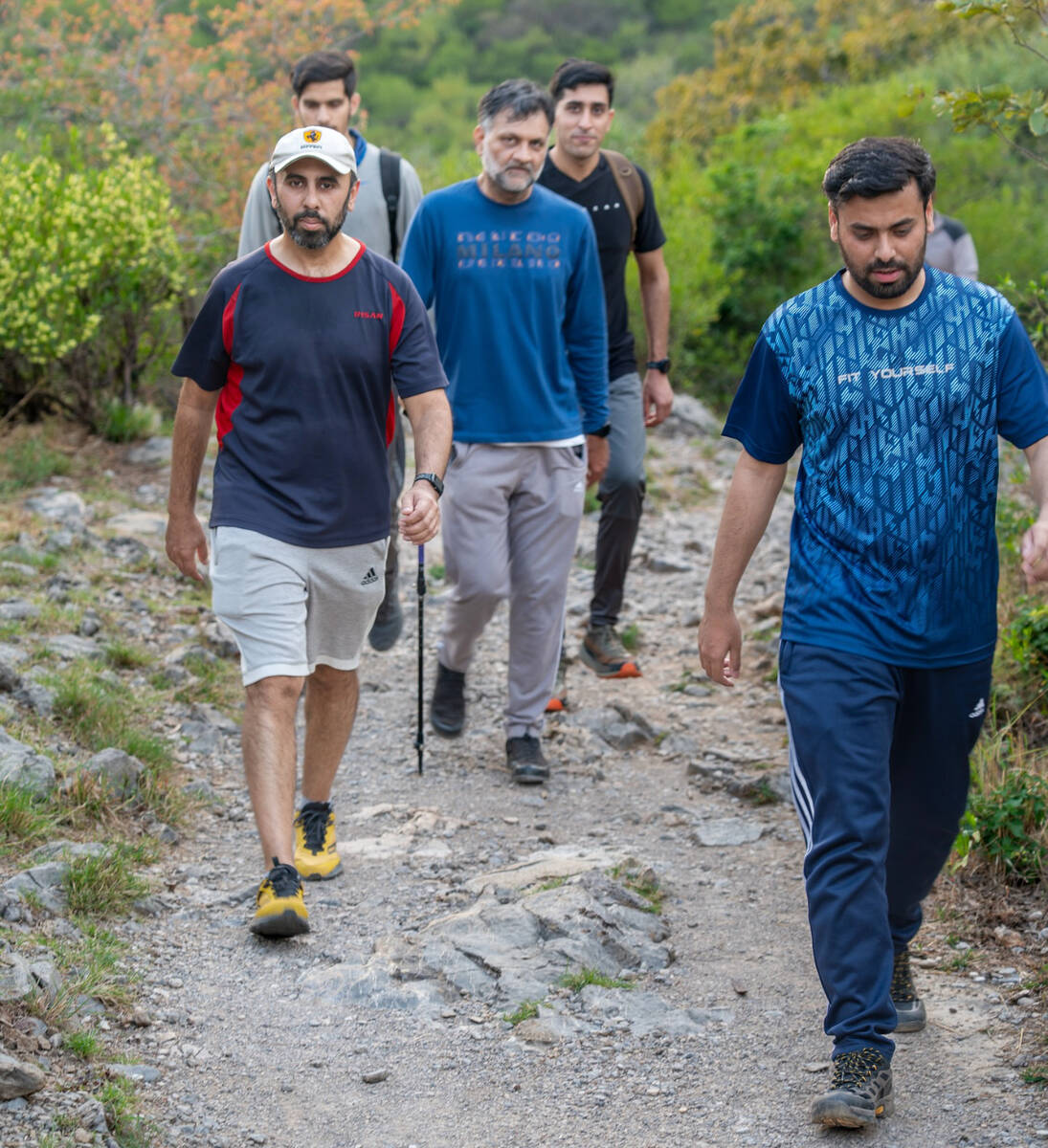
“And when someone joins in on an activity once or twice, they figure out it’s not that hard and they can sustain it comfortably.”
Naz stresses that staying active during the holy month is essential. The IRU organizes five activities a week, which include two runs and three hikes.
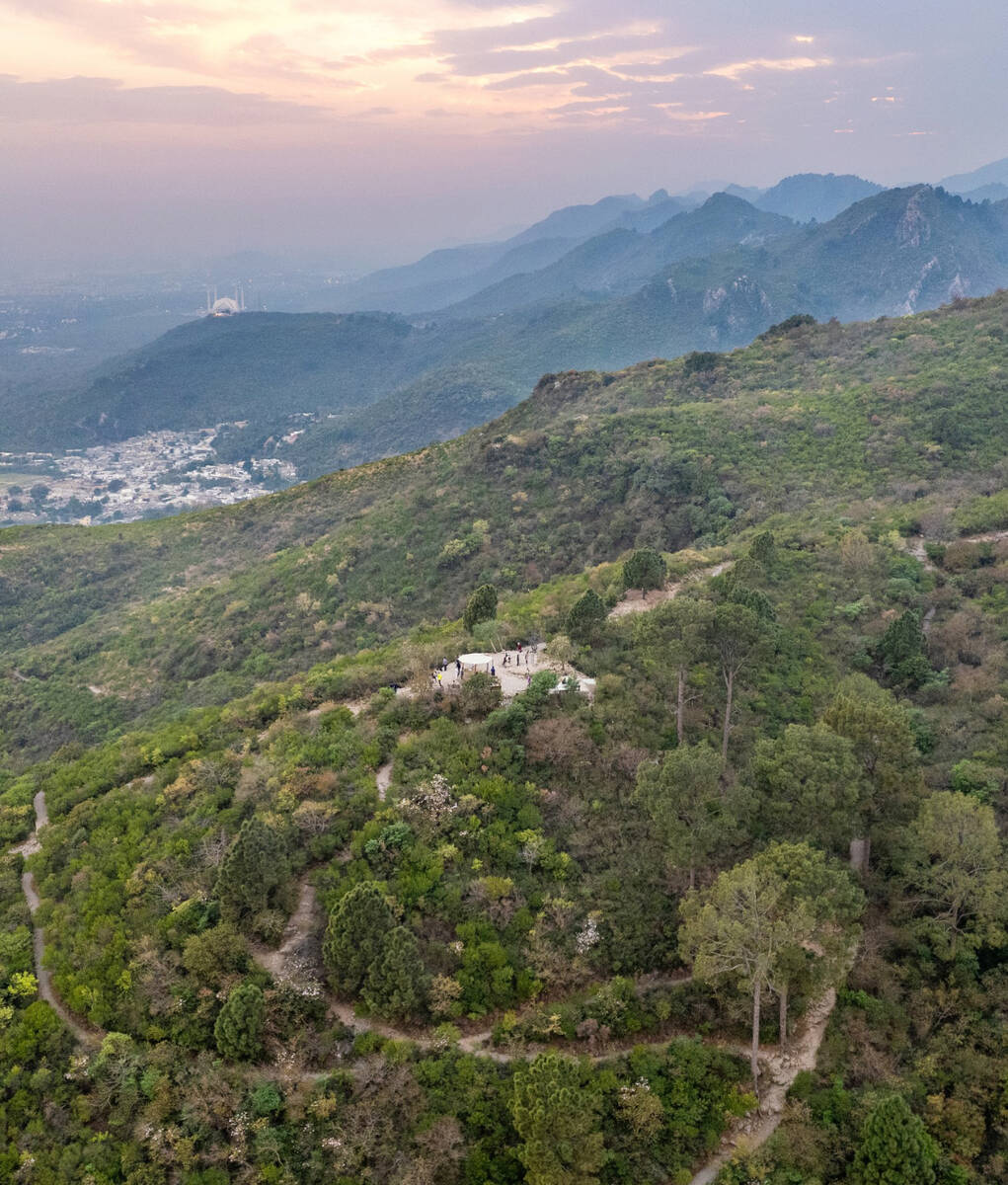
“Either we can maintain our weight, or if our goal is weight loss, we can achieve it by being in a calorie deficit while eating a healthy diet and exercising,” Naz explained.
Tahir, 22, meanwhile, said that she was committed to reaching the top of hiking trail before sunset. This was the second time she was hiking with IRU.
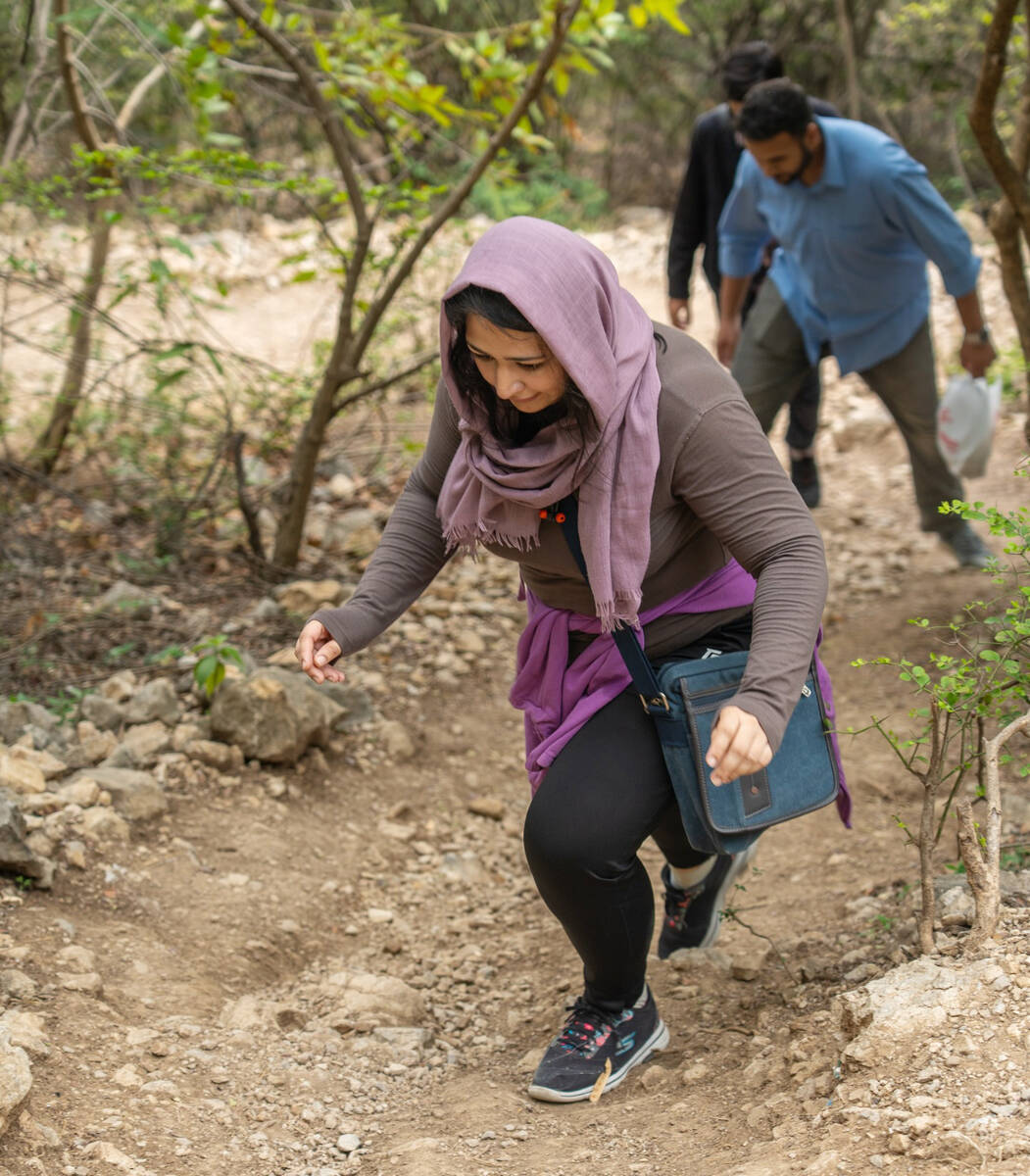
She agreed with Naz that group activities are “much easier” to sustain.
“I think it is important to go at your own pace and it’s so much easier with the group,” Tahir, a content creator, told Arab News.
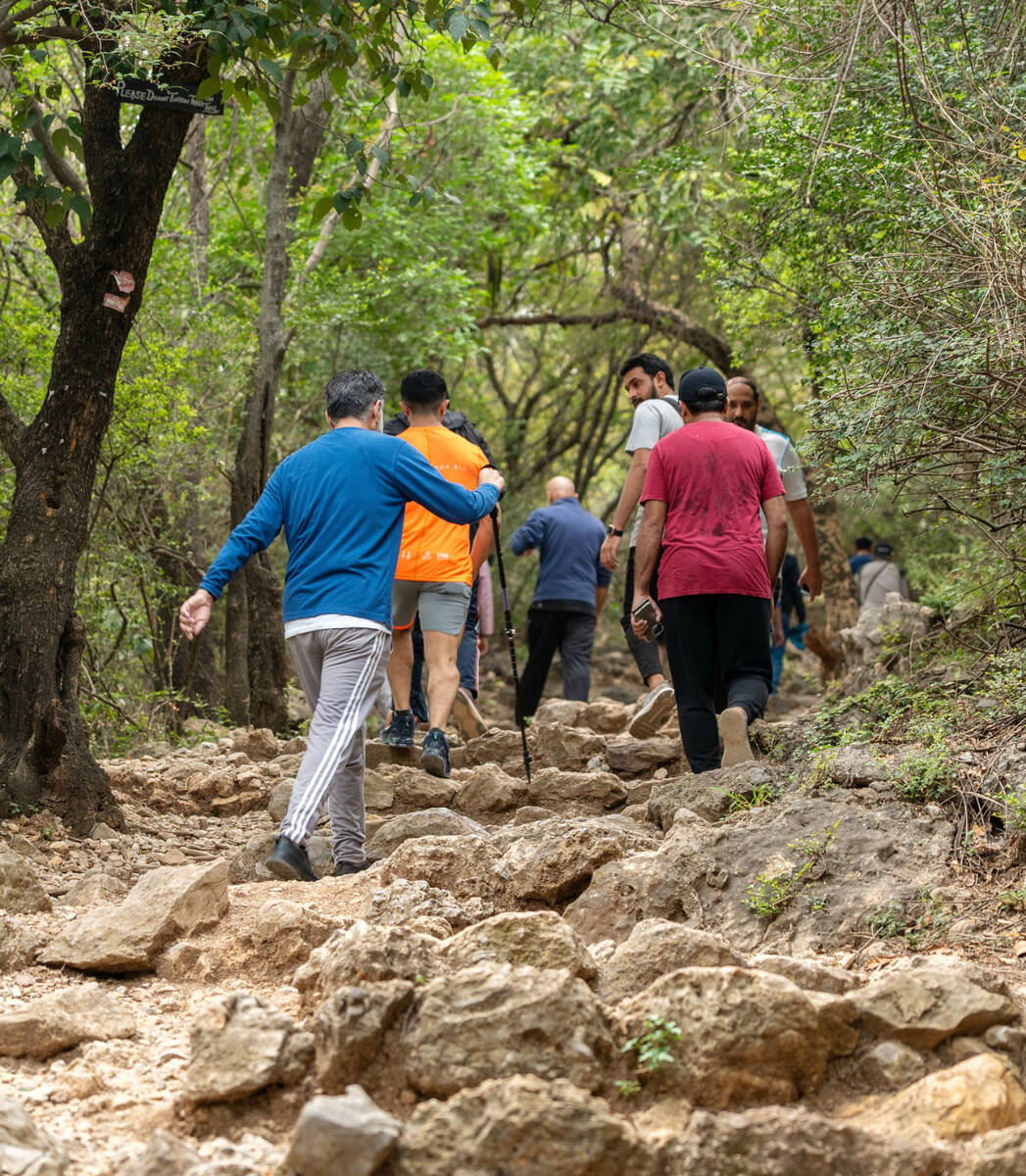
“If you go alone, it’s kind of more difficult and you are, like, really slow but if you go with the group you can maintain that pace and I think it’s much easier that way.”
Mahwish Ashraf, a journalist associated with a foreign diplomatic mission in Islamabad, shared how she struggled the first time that she went on a pre-iftar hike with IRU.
“The first time I was hiking, I returned from in between, I couldn’t complete it,” she admitted. “So, this is my second time hiking with the IRU, and gladly, I’m at the main point, the meeting point.”
Eraj Khan, a commercial specialist visiting from Australia to spend Ramadan with his family, said pre-iftar hikes give one “lots of energy.”
“For fat burning, it’s a great activity,” Khan said. “Especially because the last two hours of fasting are the hardest, most people feel really hungry. But so far, I’m loving it.”
As the clock continued to tick and evening settled in, the hikers began to pick up their pace. For Tahir, reaching the top of the trail before sunset was a victory in itself.
She had pushed past exhaustion, embraced the challenge and proved to herself that she was capable of more than she thought she could achieve.
And according to her, hiking with the group made all the difference.
“The energy of the group keeps you going,” she said. “Even when you feel like stopping, you see everyone else moving forward, and you push through.”


















